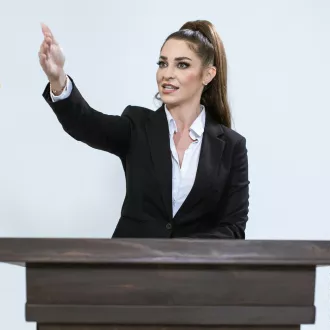Transcription Recommendations for preparing a wedding speech
Speeches are one of the most common communicative acts practiced by professional speakers. This type of speech requires the elaboration of a well-structured, concise and understandable message for the target audience. Wedding speeches take place within the framework of a wedding celebration. It is important that it is thoroughly rehearsed and revised so as not to make mistakes that could jeopardize the proper development of the festivity.
Having said this, the speaker of this style of speeches has a great responsibility, since his work is a key piece in the wedding celebration. This should motivate us to be as perfectionists as possible to provide a pleasant experience worthy of our professionalism.
During this session, we will be addressing some of the basic recommendations that you should take into account when preparing a wedding speech. These will be useful to deepen your knowledge about this important communicative act.
Prepare a concise message. Don't digress: The message we want to convey with our wedding speech should be as concise as possible. Our ideas must be focused on being the main thread of the process, highlighting the importance of the moment and placing the bride and groom as the epicenter of the audience's attention.
When elaborating our speech, we will avoid topics unrelated to the ceremony. We should not digress so as not to break the atmosphere of the ceremony, so it is very important that we take care of the coherence in every sentence we pronounce.
Undoubtedly, this is one of the most important points of any wedding speech. Contrary to other types of communicative acts, in this one there is very little freedom for improvisation or to delve into personal or unrelated topics.
Rehearse solemn and formal language: Although more and more couples decide to celebrate less formal weddings, sticking to a simpler or more colloquial style of celebration, solemnity is still the rule par excellence for this type of events. Unless the characteristics of the event indicate otherwise, focus your rehearsals on practicing formal language, with an appropriate tone of voice and vocabulary according to the ceremony.
This does not mean that your speech should have a stilted language: we must always be clear and understandable to our audience. The idea is that both the tone of voice and the oratory itself should have a structural coherence that allows you to transmit a certain degree of sobriety.
Avoid long monologues. Interact with the audience: Long monologues during the presentation of a wedding speech can become very boring or monotonous. Try to include brief moments of interaction with the audience. Develop questions for family and close friends and feed off the energy of the audience to maintain a good emotional state during the celebration.
Identify who in the audience is most closely related to the bride and groom. It is likely that funny and amusing anecdotes will emerge from your exchange with them.
Keep in mind that your job as master of ceremonies is not only to declaim a series of words, but also to lead the guests during the course of the celebration. The speaker is able to speed up or slow down each phase of the ceremony. Maintain an appropriate pace so that everything runs as planned by the organizers of the event. Through intelligent exchange with the audience, you will be able to extend or slow down the presentation times to fit the established ones.
elaborate bridal speech




